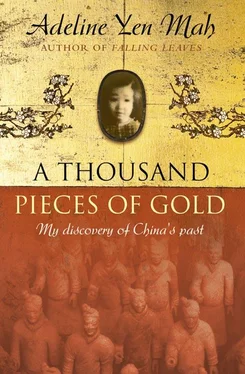Loss of One Hair from Nine Oxen
 JIU NIU YI MAO
JIU NIU YI MAO
WHEN I WAS THIRTEEN YEARS OLD, my parents told me that I was to leave school at fourteen and get a job because they no longer wished to pay for my education. Desperate to go to university, I begged my grandfather Ye Ye to intercede on my behalf. One evening after dinner, on one of my rare visits home from boarding school, Ye Ye cornered Father and they had a private conversation. Afterwards, Ye Ye related that Father had been unsympathetic. Further schooling would only strain their budget because a daughter should never be too well educated. It would spoil any slim chance I might have of making a suitable marriage. ‘No sane man’, according to Father, ‘would ever want a bride with a Ph.D.’ Therefore, as far as he and my stepmother were concerned, my education was a matter as trivial as jiu niu yi mao (the loss of one hair from nine oxen). They had made their decision and the subject was closed.
‘Loss of one hair from nine oxen’ is a phrase taken from a poignant letter written by the historian Sima Qian to his friend Ren An in 93 BC, three years before Sima Qian’s death.
Sima Qian (145–90 BC) was the taishi (‘Grand Minister of History’ or ‘Grand Historian’) during the reign of Emperor Wu of the early Han dynasty (157–87 BC, ruled from 141–87 BC). He was responsible not only for keeping historical records, but also for regulating the calendar and doing research on astronomy. Such positions were handed from father to son and the Sima family had been Grand Historians for many generations. Sima Qian’s father, Sima Tan, had also been Grand Minister of History. Even as a boy, Sima Qian was groomed to step into his father’s shoes one day.
It had been Sima Tan’s dream to write a comprehensive history of China. With that in mind, he collected many ancient tales and historical writings and shared them with his son. He encouraged the young Sima Qian to embark on three separate journeys to explore the length and breadth of China. There is evidence that, in travels similar to those of the Greek historian-traveller Herodotus with whom he has often been compared, Sima Qian reached the Kundong Mountains of Gansu province in the west, the battlegrounds of Julu in Hebei province in the north, Confucius’s birthplace of Qufu in Shandong province in the east and the Yangtze river in the south. While lying on his deathbed in 110 BC, Sima Tan extracted a promise from his son that he would one day realise his father’s unfulfilled dream of writing a comprehensive history of China.
Sima Qian was appointed Grand Minister of History in 107 BC. Two years later, he finally assembled sufficient material to begin the laborious writing process. In those days, paper had not yet been invented, so characters were written with a brush or carved vertically with a knife on to narrow strips of bamboo or wood. Unfortunately, soon after Sima Qian began writing, disaster struck.
At that time, China was frequently troubled by raids from nomadic tribes (called Xiongnu or Huns), living in the desert areas north-west of China (present-day Mongolia). In retaliation, Emperor Wu would dispatch military expeditions into the desert to harass them. In 99 BC, the young, dashing and usually victorious Han commander Li Ling led a force of 5000 men in a daring raid deep into enemy territory in an attempt to capture the Hun ruler. Vastly outnumbered, Li Ling was defeated and finally surrendered after he ran out of food and arrows. On hearing this, Emperor Wu became furious. In the case of defeat, the monarch expected his military officers either to die in battle or commit suicide to avoid capture. Surrendering to the enemy was considered cowardly and despicable. He proposed punishing Li Ling by confiscating his property and imposing death sentences on his family members to the third degree (parents, siblings, wife and children).
Sima Qian, who knew and admired Li Ling, tried to defend him in court. By doing so, he enraged Emperor Wu even further. The monarch first cast Sima Qian into prison for daring to speak up on behalf of a ‘traitor’, then, a year later, he accused the historian of attempting to deceive him and sentenced him to death. In those days, it was possible for disgraced officials either to buy their way out of their death penalty or to submit voluntarily to castration. For those with insufficient funds, tradition dictated that death was far preferable to mutilation, for only the most cowardly would choose to live with such shame.
Unable to come up with the money to redeem himself, Sima Qian chose castration over death in order to complete the writing of his book, Shiji. Afterwards he became tormented by guilt for having chosen this ‘lowest of all punishment’. Not wishing to appear spineless and unmanly, he wrote to his friend Ren An to justify himself and to explain the rationale behind his decision.
Ren An was the governor of Yizhou, now called Sichuan province. In Sima Qian’s famous letter, which may never have been sent to its intended recipient, the historian mentions that Governor Ren himself had recently fallen out of favour with the Emperor and was being accused of major crimes. The entire letter is composed of 2401 Chinese characters and was probably written in 93 BC. Below are three segments that I have selected and translated.
If I were to die now as befits my punishment, my death would be as insignificant as jiu niu yi mao (the loss of one hair from nine oxen). How would it differ from the demise of a cricket or an ant?
Besides, posterity will never consider such a death to be comparable to that of someone who perishes out of a sense of honour. They would say that it came about only because I had exhausted all other avenues of expiating my crime, yet found it impossible to forgive myself.
So, why should I confirm their condemnation by carrying out this deed?
A person dies but once. That death may be as monolithic as the Tai mountain or as trivial as a goose feather. It all depends on him…
Having chosen castration, Sima Qian was well aware of the humiliation and suffering awaiting him for the rest of his life. He continued:
I have incurred upon myself the derision and ridicule even of men from my own village. I have dishonoured my family name. I can never stand proudly again before the tomb of my parents. Even after the passing of a hundred generations, the memory of my disgrace will still linger on. This is what grips my mind and twists my guts nine times a day. Resting at home, I am in a daze, as if I have lost my way. I venture out, and know not what I should do or where I should go. Every time I remember my disfigurement, the sweat pours out and seeps through my robe. I have become no more than a slave in a harem. How can I disappear and hide myself somewhere in a remote mountain cave? Hence I go along with the common crowd, drifting aimlessly, gliding up and down with the tide, sharing their illusions and madness.
Towards the end of the letter, he concluded:
I encountered this monumental catastrophe before completing my manuscript. Because my work is not yet finished, I had no choice but to submit meekly to this most severe of punishments [castration]. When my book is finally written, I shall place it in the famous mountain archives for posterity. And should my words one day penetrate the minds of men who will value them, allowing my thoughts to burrow into the counties as well as great bustling cities, then even if I should suffer ten thousand deaths by mutilation, I would have no regrets…
Instead of suicide, Sima Qian channelled his energy into writing his groundbreaking book Shiji (Historical Record). Totalling just over half a million words, it chronicles events from the time of the Yellow Emperor (a legendary and largely mythical ruler and sage who supposedly invented boats, oars, the compass and the fire drill, and lived in 2400 BC but the date is uncertain) to the reign of the emperor who condemned the historian — a period of over two thousand years. His book records the ancient history of China, a country about half the size of present-day China with its population clustered around the Yangtze and the Yellow River. From it we learn that the Shang dynasty lasted from 1765–1122 BC, and was followed by the Zhou dynasty. A succession of Zhou kings ruled China for about three hundred years through feudal vassals appointed by the king. China was vast even then and these feudal lords were given free rein to govern their territories as they saw fit. As time went on, the descendants of the local rulers became increasingly rebellious and independent. The stronger ones developed their own armies and defied the king.
Читать дальше

 JIU NIU YI MAO
JIU NIU YI MAO










